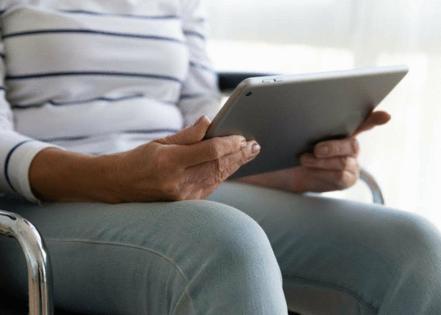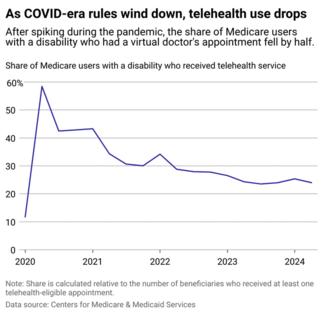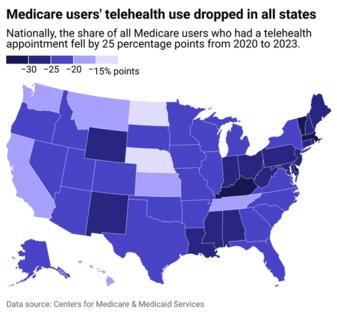For people with disabilities, telemedicine's decline may alter their health care experience
Published in Slideshow World
Subscribe
For people with disabilities, telemedicine's decline may alter their health care experience
Telemedicine has been viewed as a potential equalizer to health care access, but as the policies from the COVID-19 pandemic wind down, people who need it most continue to have the least access to the service.
Pandemic-era policies rapidly expanded access to telehealth—also known as telemedicine—which allowed patients to consult remotely with health care providers using video or phone calls. This applied to those with or without private health insurance, according to an analysis from KFF.
Before March 2020, virtual visits among Medicare recipients were limited primarily to people living in rural areas. Even then, only certain types of visits were covered, and patients had to leave their homes to receive treatment at an approved site.
Temporary rules during the pandemic created more flexibility for patients who could now connect with any type of provider from the comfort of their living rooms, no matter where they (or their doctor) lived. This was particularly beneficial to people with disabilities who faced barriers that made it more difficult to attend doctor appointments in person.
Analyzing CMS data, accessiBe examined how telehealth services have changed from 2020 to 2023 and their impact on people with disabilities.
Ongoing barriers to health care for people with disabilities
According to 2019 research from the Centers for Medicare & Medicaid Services, about 1 in 7 people with disabilities were unable to receive care, in general, compared to 1 in 10 of those without a disability. The most common reason was the lack of transportation. Other barriers to care can include nonaccessible features at doctors' offices, such as narrow doorways, insufficient or nonaccessible parking, and steep ramps, among others. Patients with low vision or who are hard of hearing can also struggle to communicate with their providers without appropriate accessibility services, such as sign language interpreters or Braille materials.
These temporary policies expired in December 2024, but all Medicare patients can still access telehealth appointments through March 2025. After that, telehealth appointments will only be covered in specific circumstances, including those receiving at-home dialysis treatments for kidney failure, virtual stroke diagnoses and treatment, and mental health services. Additionally, in January 2025, the Drug Enforcement Administration announced policies to limit doctors' ability to prescribe controlled substances via virtual visits.
It is now up to the current administration in Washington D.C., to determine whether to keep these policies in place. In the past, President Donald Trump has been open to telehealth as a way to prevent overcrowding of hospitals and doctors' offices during the pandemic.
American adults living with disabilities are more likely to report being in fair or poor health than those without disabilities, according to the National Institutes of Health, which designated them as a population with health disparities in 2023. At the time, Xavier Becerra, then the secretary of the Department of Health and Human Services, said it was "unacceptable" for people with disabilities to lack access to all the care they need, and research is essential to addressing ongoing barriers and unmet needs.
Visit thestacker.com for similar lists and stories.
What's behind the decline?
The share of Medicare users who utilized at least one telehealth appointment was highest in 2020, when about 48% of eligible visits were conducted remotely, according to a December 2024 telehealth trends report from the CDC. For Medicare users with a disability, that number was slightly higher, with almost 60% using the service. However, by 2023, usage fell by about half for both groups to just about 1 in 4 people who relied on virtual visits.
Besides reducing physical barriers to attending appointments in person, advancements in telehealth technology have made virtual visits easier for people with hearing and vision disabilities. However, challenges remain. The Americans with Disabilities Act of 1990 requires equal access to medical care, including telehealth appointments, and includes accessibility recommendations for providers, such as using an online platform that has real-time captioning, providing audio tracks that describe what is happening in an online video, and ensuring their technology is compatible with screen readers.
When treating patients with hearing loss, the Justice Department's Civil Rights Division recommends ensuring the telehealth platform allows third-party interpreters to join the call or provide real-time captions. The platform should also be compatible with screen readers for patients who are blind or have a visual disability.
However, while screen-reading technology and automated captioning have vastly improved in the last few years, important information can still slip through the cracks. Even worse, typos or errors can add confusion and lead to serious medical repercussions, so it's important to continue reviewing accessibility implementation.
Who's being left behind?
While state-level data was unavailable for Medicare beneficiaries with disabilities, CMS data shows telehealth use among all Medicare users fell significantly in all 50 states from 2020 to 2023.
The largest drops were in Northeastern states, including Rhode Island and Massachusetts, while in states with more residents who live in rural areas, such as North Dakota, the drop was lower than the national rate.
Part of the reason for the decline is differing state-level regulations on the delivery of health care across state lines. For example, a medical professional not licensed to practice in Vermont must apply for a full Telehealth License. Even then, each health professional cannot see more than 20 patients living in the state. By contrast, Montana, which has a large rural population, does not require a license to practice telemedicine in most cases.
The use of telehealth continued to fall across all demographics in the first half of 2024. However, usage remains highest among people under the age of 65. The percentage of people using telemedicine has been consistently higher in urban than rural areas, often linked to a lack of infrastructure and broadband access.
While fewer people will be able to use telehealth services once COVID-era policies officially wind down in 2025, it is clear virtual visits will continue in some form. It remains to be seen whether the new administration will continue to expand access and how.
Story editing by Alizah Salario. Copy editing by Sofía Jarrín. Photo selection by Clarese Moller.
This story originally appeared on accessiBe and was produced and distributed in partnership with Stacker Studio.









Comments